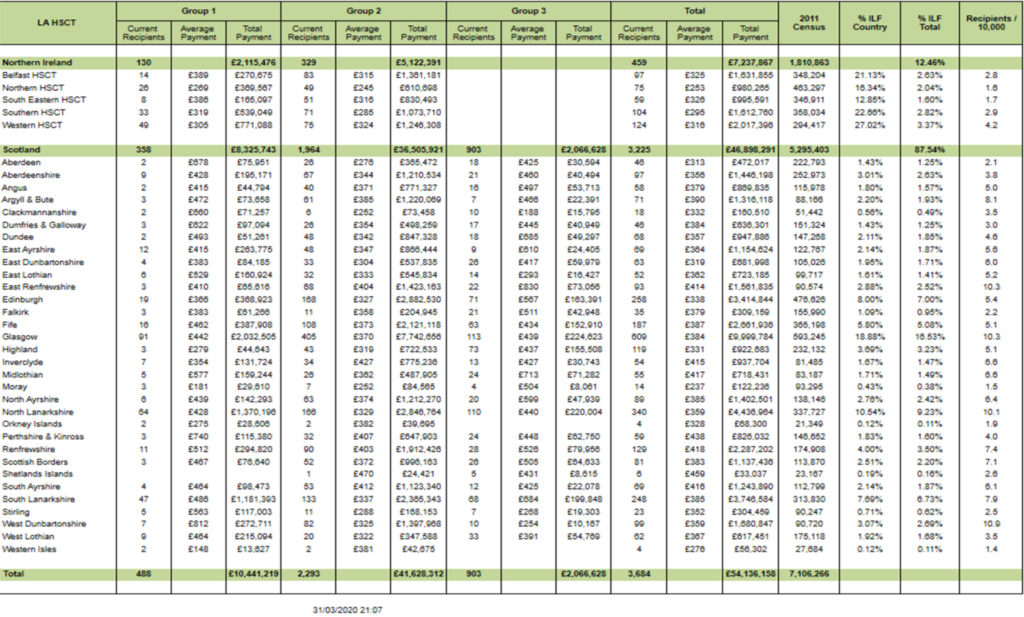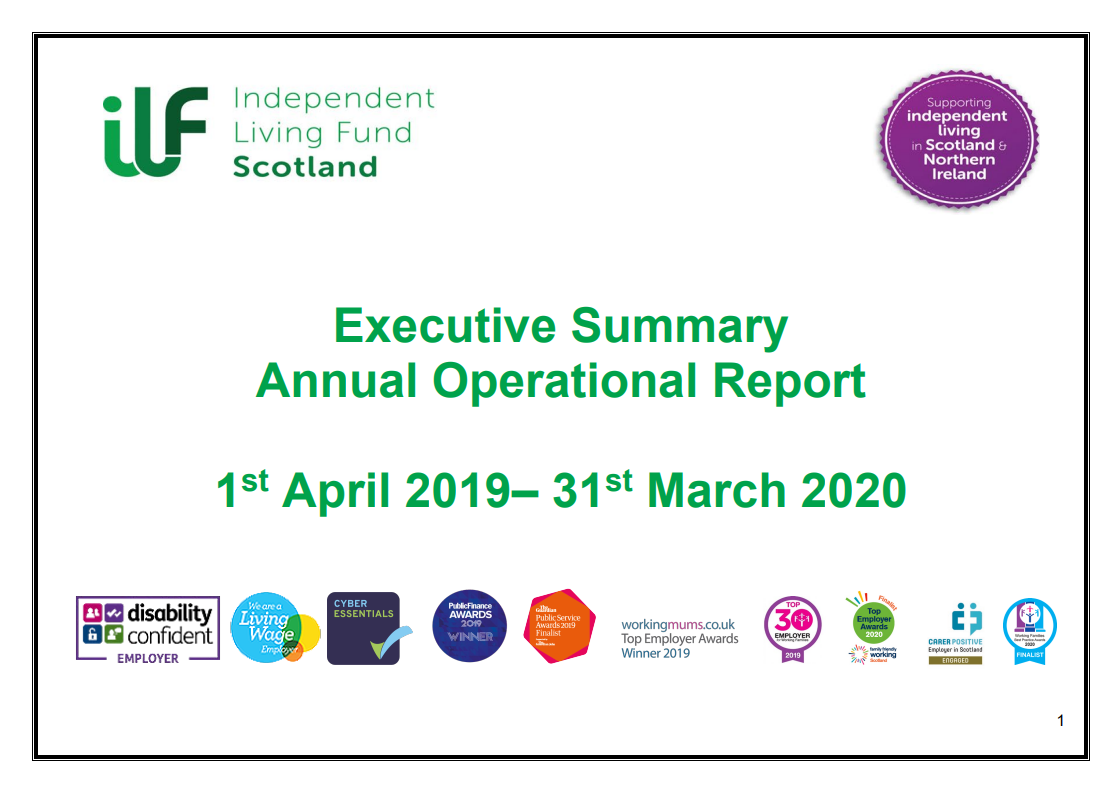
Annex A Operational Dashboards Annex B Statistics
The purpose of this report is to provide a summary of achievement and activities against the 2019/2020 business plan between 1st April 2019 – 31st March 2020.
a. Overview – As we come to the end of another successful year for ILF Scotland, we are also all coming to terms with the global crisis caused by the Coronavirus or Covid-19 that has impacted on everyone in the country and indeed the rest of the world. Specifically, we have had to rapidly think what this means for us, the people we support, how we integrate with the wider governmental response and what actions we take in both Scotland and Northern Ireland.
For those disabled people that receive our support and rely on personal assistance in these uncertain times, it has been very difficult indeed. Social distancing is not possible when personal care is needed, so disabled people and their supporters are in a very challenging space. Also as many individuals who receive funding from ILF Scotland are also employers, they face further problems as many of their personal assistants are having to take time to socially isolate or need proper protection to carry on their day to day jobs. Coupled with this, those individuals who commission support through providers, are further tested due to the radical change in how that is delivered.
Many ILF Scotland disabled people are at high risk should they contract Covid-19. All of these factors, along with our duty as citizens to stay at home, stay safe and save our NHS means for many, these are worrying times.
Overall, the culture that has been created at ILF Scotland, coupled with how we have been staffed, structured and trained, has meant that we have been able to pivot the organisation to respond to the crisis almost overnight; to protect our staff and those we support. At national level though, with the initial priority on the NHS and the economic challenges of employment and caring for families at home, there has been less initial attention given to the people who provide care – the Personal Assistants and the ability of our recipients to find Personal Protective Equipment (PPE) or replacement PAs when theirs self-isolate.
The key challenge for ILF Scotland was to be flexible in our policy suite and to allow recipients to continue to pay their PAs, whilst trying to find additional support and we worked quickly with Scottish and Northern Irish Governments to make sure we could do this. Though this is still a very dynamic situation and we have more to do, colleagues in our Government Sponsor Teams have performed brilliantly and have enabled our already agile posture, to be even more responsive to the shifting landscape.
This final quarter of reporting has seen a transition to a new way of working, which is likely to be the new normal for the first part of 2020/21. The most significant change has been the suspension of physical review visits for 2015 Fund recipients and we have started conducting interim reviews and welfare checks by telephone, email and video calls. Feedback to date suggests this is working well.
Technically, the organisation has moved almost seamlessly to remote/home working and the digital strategy to date has supported this well. 60% of the workforce were already homed based workers with a further 15% regular agile workers operating from several different locations during the working week. The biggest operational challenge has been managing inbound post and telephone calls, but this has been addressed through a skeleton operational team on rotation and all staff equipped with mobile telephones to retrieve voicemail and contact recipients. Should the office close, business will continue as per our new normal with staff local to Livingston collecting the mail direct.
As we look back over the full year, ILF Scotland also achieved a significant milestone towards the end of Q4 with us reaching more than 4,000 people we are supporting, which is the first time we have exceeded this number. This growth is due to the increase in take up of the Transition Fund.
Internal communications and staff wellbeing have been uppermost in our minds this period, both addressing the new working practices and supporting staff through unsettling times. To date, this is working well with regular twice weekly communications, bi-weekly newsletters, social media and Yammer posts and the use of WhatsApp and Skype for Business video conferences.
Externally, we have also informed our recipients about our practices regarding Coronavirus and prior to the lockdown period they all received a personal letter. Since then, we have used our social media channels, our website and our forum to communicate and signpost information and resources for recipients and partner agencies and organisations. Of note, we recorded a video from our Chair who made a very personal statement during this difficult time and we now have this as our main website feature.
Over the year, ILF Scotland has continued to develop the organisational strategy as shown in the connected business plan report. The extensive engagement with approximately 500 individuals and numerous organisations in Scotland and Northern Ireland to date has been incredibly positive forming the basis of the new 2020-23 strategy planned for publication in 2020/21. What is very clear from this extensive engagement is the ever increasing challenges disabled people face with constant pressure on their ability to live independently.
Reopening the 2015 Fund to new applications is a key priority. Widening further the criteria for the Transition Fund, stopping charging for fund use and digitisation of service provision is all coming through strongly in the whole consultation. Towards the end of Q4, it also became very apparent that people were looking to ILF Scotland for advice and support regarding employment of personal assistants, care providers, furloughing and employing family members as replacement care. This has highlighted a future leadership and signposting role for ILF Scotland, as well as continuing to develop our policies and finances to respond to the needs of disabled people and their carers.
The operational tempo overall has increased slightly if measured directly in terms of reviews. The number of 2015 Review reports completed in Q4 increased by 3% compared to last year and Transition Fund applications by 58%. What has become apparent and hugely pressing, is that the volume and complexity of work has increased significantly over this last year. This in turn has placed tremendous strain on the infrastructure and the operational processes. Even with some efficiency gains made over the year, the historical nature of our systems, processes and communication capabilities coupled with the lack of recipient self-service and automation has meant that we are using legacy systems which now require to be updated. This is being addressed. We have had extremely constructive conversations with the SG Sponsor Team and Health Finance Team to plan next steps for 2020 and beyond. This has resulted in a formal submission of an Outline Business Case for major capital investment in 2021 to undertake the required digital and process transformation, although this may be further delayed due to the current crisis.
On the 4th November at the Celebration event for the first year of the Transition Fund, the Cabinet Secretary for Health and Sport, Jeane Freeman MSP announced the extension of the age range from 16-21 to 16-25, which has potentially opened up access to the Fund for many more disabled people in transition. Since the change in policy around age range, we have received 80 new applications from young people in this group in this financial year. That said, it is becoming increasingly apparent that the Transition Fund is being forced to plug major gaps in local provision and as a result has become a transition service, rather than a more simple grant scheme. This has implications for resourcing and the way the scheme operates in the future. Q4 was also a significant turning point for the number of applications being received online and we believe this is due to a combination of the communication campaign, increased engagement activities and what we are calling “the big green button”, which is making it a lot easier to go straight to the online application form. The good news is that we have spent all of our allocated grant budget for this year and are likely to be requesting a drawdown of larger sums next year.
In Northern Ireland, extensive background work has been completed to prepare for the potential reopening for the 2015 Fund. Alongside this, a major piece of research has been completed which demonstrates the impact and social return on investment (SROI) of ILF Scotland funding which will go towards the business case for reopening. Now verified, it shows that for every pound of ILF Scotland funding invested in social care, it returns £10.89, which equates to £74.569 million of SROI in Northern Ireland this year alone. The report for this work has been finalised in Q4 and will have considerable relevance to Scotland in the future. In tandem with this, work has also been carried out to set up an advisory board to co-produce the new scheme and its first two meetings were held in January and March 2020.
Over the year, the organisation has been proudly recognised as a Top 3 UK for Care Services in the Guardian Public Sector Awards 2019, we were a winner at the Working Mums Best Employer Awards, a Top 30 UK Employer for Working Families, have been a finalist in the Family Friendly Working Scotland 2020 Awards, were awarded a Healthy Living Bronze, achieved Carers Positive status and gained Cyber Essentials Plus for a second year. This external recognition is due to the hard work and professionalism of our staff, always going the extra mile to make a real, positive impact for disabled people in Scotland and Northern Ireland.
Finally, as this year concludes the full successful delivery of the strategy set in 2016, we look forward with optimism to building on the foundations created to enable even more people to live independently with control, choice and dignity through our new strategy.
Finally, as this year concludes the full successful delivery of the strategy set in 2016, we look forward with optimism to building on the foundations created to enable even more people to live independently with control, choice and dignity through our new strategy.
b. Key Operational Activities - Over the year, the following key activities have taken place:
i. Strategic Outcome 1 - The Existing Fund has been maximised for effective value:
ii. Strategic Outcome 2 - A New ILF scheme is successfully introduced and established in Scotland:
iii. Strategic Outcome 3 - The knowledge gained through our work across all of Scotland and Northern Ireland has been shared to develop best practice:
c. Main Effort - The main effort during 2019/20 has been the development of our new strategy and policy suite, whilst maintaining the operational tempo of the 2015 Fund and the Transition Fund. This has seen a tremendous effort with running engagement activities, consultations, stakeholder review events, applications processing and implementing the end of grant process and responding to the Coronavirus situation. Alongside the re-accreditation for Cyber Essentials Plus, a full technical server upgrade and the continuous improvement work, the records management project and commencing the risk and resilience project, ILF Scotland has seen possibly its busiest year yet and has transitioned to the new way of working almost seamlessly.
d. Call Volumes – This year we have received 10,254 (6,866 telephone and 3,388 email enquiries) in 2019/20 compared with 9,903 (7,956 telephone and 1,947 email enquiries) in 2018/19. This 4% increase is due to a rise in operational activity and growth in Transition Fund related calls. However, the number of enquires would have been at least 10% higher had Covid-19 not impacted on a reduction in enquires in March 2020. On average, 96% of all calls are from Scottish recipients with 4% from Northern Ireland. There are relatively few emails from 2015 Fund recipients, which is explained by the fact that most do not have or use emails but where we do receive enquiries, these are mainly for respite, requesting forms or queries regarding their award. Most emails come from applications for the Transition Fund and at present, stage one requires an email request to validate the application. Thereafter, applicants are using email to submit quotes, receipts, support letters and to complete the end of grant process. The main areas of enquiry are as follows:
e. Quality Journey – Further progress has been made with internal communications, recipient feedback based policy development and meaningful meetings reporting. Q4 also saw a small re-configuring of the organisational structure with the formal appointment of an Improvements role which sits under the new Director of Policy, Improvement and Engagement. The thinking is that we are moving more towards data driven change management and the Policy Team are foremost in capturing feedback from those that use our services, therefore best placed to identify the priorities for change. We will be adopting the Quality Improvement Model advocated in the Scottish Government’s “3-Step Improvement Framework for Scotland’s Public Services” to ensure a more systematic approach to improving quality and leading change across the organisation.
f. Complaints – Across both funds, we received 4 complaints over Q4 compared with 9 in Q3. Staff are becoming increasingly skilled at identifying areas of dissatisfaction, classifying and recording these as complaints and taking immediate action to try to resolve informally at the earliest stage possible. We capture each learning point from this valuable feedback about our service and act to address this through revised procedures, staff training, etc. in the spirit of continuous organisational improvement. Across both funds, we received 21 complaints this financial year compared with 13 received in 2018/19. We expected this increase as we implemented an enhanced feedback loop, which is helping us deliver even better support to recipients.
g. Intern – ILF Scotland has worked with Inclusion Scotland and Scottish Government to recruit and place our first intern who will review and make recommendations for improvements to our Transition Fund communications and application forms used by recipients during Q4 2019 - 20/Q1 2020-21.
h. Social Work Student - our third very successful social work student placement, in partnership with Stirling University has cemented our reputation as an excellent placement and increased our credibility across the social work landscape.
i. Future Work – The focus for the next reporting period will be in line with launching the strategy and implementing the new business plan post Covid-19. The key areas of strategic planning, preparatory work for reopening the 2015 Fund in Northern Ireland, new approaches for Scotland, records management, business resilience and development of the digital transformation roadmap. Once we are more settled and allowed to conduct recipient reviews following the future easing of movement restrictions with Coronavirus, we will then look to re-establish the normal cycle as quickly as possible, prioritising our reviews to help address those most affected by it. We will aim to launch our new strategy, but the business plan for the first two quarters of 2020/21 is likely to remain a continuity of normal operations until we establish at Ministerial level our priorities for moving forward.
a. 2015 Fund Numbers – Over the year 2015 Fund recipient numbers have dropped to 2,690 (Scotland 2,254 & NI 436) from 2,813 (Scotland 2,346 & NI 467). This represents an overall decline in line with the trend of around 4.4% (3.9% Scotland & 6.6% NI) per annum.
b. 2015 Fund Operational Performance – This year saw an increase of 12% in reviews completed compared to last year. Combined with a 16% reduction in overall processing time, this has been our best operational performance to date despite the challenges faced internally and externally articulated elsewhere in this report.
c. Policy Revision - We have completed the following in this reporting period:
d. Scottish Living Wage (SLW) – We implemented the new SLW on the 1st April 2019 and completed all work for the 2020 uplift to £9.30 per hour before the year end, as agreed by Scottish Government. We do not have approval to implement an automatic update to the national minimum wage for NI recipients, but can continue to match Direct Payment rates and increase on an individual, case by case basis.
e. Social Work Update – As reported above, whilst we saw Assessor reviews increase, on 16th March 2020 all visit and engagement activity was suspended and the review cycle continued by telephone. Assessors have since started to provide a Welfare Check for all recipients prioritising Group 1 recipients as they may not have active social work input.
At a strategic level, as part of the review of adult social care, a meeting in February 2020 of the SG Investment Workstream helped contribute to a national conversation about a new scheme for independent living, as part of a range of potential improvements to social care. Alongside this, ongoing engagement work has been carried out with NI ILF Trust Leads to look at improvements in outcomes for recipients and any impacts of Self Directed Support (SDS) as it rolls out. Maintaining these key relationships has helped foster a supportive stance from Social Work Departments in Northern Ireland towards the potential re-opening of the 2015 Fund.
In Q4, we also provided formal input and revision of Scotland’s Social Care charging policy. COSLA have accepted several ILF Scotland recommendations to embed SDS principles. Specifically these feed into charging, for national consistency and greater involvement of disabled people in the process.
This year has seen ILF Scotland become an established social work partner of choice for many public and 3rd sector organisations which is evidenced by the number of invitations to present, contribute or formulate policy and practice in Scotland and Northern Ireland: we are maximising the opportunity that ILF Scotland brings to have difficult conversations that promote real change and in providing a leadership role in this area.
f. Feedback – The way that we request and receive feedback from 2015 Fund recipients remains hugely important to ILF Scotland. With work being undertaken through research into the Transition Fund and 2015 Fund Northern Ireland by external bodies, the decision was taken to implement an improvement project based around recipient feedback. This project has looked at all surveys and engaged with external organisations to transform the way that we interact with recipients. On average in 2019/20 feedback has remained high, at 95% satisfaction. Work is ongoing in this area and it remains an improvement priority for the coming year.
a. Transition Operational Performance – On a like for like basis, the number of applications received is up 58% from 831 in 2018/19 to 1,312 in 2019/20. It should be noted that final figures of applications received, processed and decisions made on funding will take between 3-6 months to finalise. There is always a difference in those received via all channels and those processed on the system and numbers may slightly drop if applications are withdrawn. The trend of declined and withdrawn applications has reduced from around 21% in 2018/19 to 16% in 2019/20. This is due to better information at the front end, more engagement, more online applications and triaging of all applications introduced this year. As a result of this, not only does this save a huge amount of time for staff, but more importantly prevents disappointment and wasted effort from potential applicants
Numbers of recipients in payment have grown from 520 by the end of 2018/19 to 1,350 in this reporting period, an increase in 160%. The average time to process an application is 73 days, which is better than 87 days in 2018/19 due to aforementioned reasons coupled with exceptional hard work from staff over and above the normal. However this masks the challenges faced by staff to process applications, since many applicants need major support to get their documentation to the evaluation stage.
This has implications for resourcing and the way the scheme operates. It is of note that the 2019/20 funding budget has been fully committed in this financial year, while we have in progress a considerable number of applications at various stages of authorisation, which will be paid in 2020/21. This may place significant pressure on the fund at existing budget levels in the coming year and we will discuss this with our Sponsor Team at Scottish Government should this turn out to be the case..
Practice has become further developed and we have put in place an authorisation matrix for commonly requested items and services, which allows the casework team to more easily process requests and has created additional processing capacity to manage the increase in applications that we have seen over the year.
b. Social Work Update – This year has been nothing short of transformational for the Transition Fund. There have been two major developments in the team within the year; the creation of a dedicated casework team for the fund and the secondment of two assessors from the 2015 Fund. The further addition of the engagement officer post to the communications team in support of the engagement strategy has really started to pay dividends in take-up. This increase in the capacity for engagement work has seen us continue to target statutory and 3rd sector organisations who work with the young people that we seek to assist. In addition, we have specifically targeted schools in the most deprived areas, according to the Scottish Index of Multiple Deprivation (SIMD). Assessors initially targeted the schools in the indicated areas in Edinburgh and Glasgow and had more recently begun to expand out into Lanarkshire and Lothians.
Real life examples of the fantastic outcomes young people can achieve have been presented at several national conferences, creating dialogue and demands that SDS integrated in transition is delivered in a way that meets real world outcomes. We helped create a National Framework for Transition, which can significantly improve transitions for all young disabled people in Scotland. The framework will be presented to Scottish Government and COSLA and recommended for adoption by all statutory stakeholders - the Transition Fund has begun to create a legacy beyond the individual benefit recipients have evidenced.
c. Feedback– 2019/20 has been the first full year of data from the Transition Fund suite of surveys which cover the satisfaction ratings for those who have been declined a grant, those who made successful applications and those who have reached the end of their grant period. The averages have remained high and a vague comparison can be made between this year’s figures and results from 2018/19, although this should be treated with caution as the averages for 2018/19 only cover Q3 and Q4, for ‘declined’ and ‘successful’ applicants, and only Q4 for ‘end of grant’. The averages are below:
| 2019/20 av. return rate | 2018/19 av. return rate | 2019/20 av. satisfaction | 2018/19 av. satisfaction | |
| Declined | 15% (80 sent) | 8% (40 sent) | 33% | 50% |
| Successful | 26% (394 sent) | 26% (345 sent) | 91% | 99% |
| End of Grant | 10% (254 sent) | 43% (7 sent) | 94% | 100% |
It should be noted that the return rates for declined applications are so low that they greatly affect the satisfaction ratings in this category. For instance in 2019/20 3 surveys were returned as opposed to 2 in 2018/19 and that is enough to cause a % satisfaction reduction of 34%.
a. Overview - The final quarter of 2019/20 has been challenging, but also commendable as all the staff team have transitioned to remote and home working almost seamlessly during the Coronavirus situation. Our priority is always to put disabled people at the heart of what we do and the efforts of everyone to safeguard, check and ensure that our recipients have the resources and support they need to continue their lives has been the focus of our entire team. A vast amount of work has been done at pace to ensure the policies, practices, finances and technologies are in place to support this effort and all staff have to be praised for how they have risen to these challenges.
Whilst we have a formal Business Continuity Plan (BCP), we have not needed to instigate it due to Covid-19 because of our business as normal flexible working. This has not only validated what we have done in the past, but enabled us to enhance our employee offering so all staff regardless of role are even more flexible. Though none of our triggers have been reached for formally instigating the BCP, the key weakness has been the availability of group video communication channels due to bandwidth pressures, however this will be addressed early in 2020/21.
Over the last year we saw the sad loss of a colleague and also had the retiral of a long standing staff member who have both been with ILF Scotland from the start. Due to the strength in depth and good succession planning, this has not impacted on operations but we will miss these brilliant colleagues very much. In terms of activity, even discounting the addition of Covid-19 to contend with, we have had a very busy year.
Health and Wellbeing has been a central plank to our developmental work, gaining a Healthy Living bronze award in year. We have enhanced the support to staff driven by last year’s staff survey, including but not limited to increased activity through our staff wellbeing group and a 4th Mental Health First Aider being trained. We have also engaged our Mental Health trainers at ‘strongmindedresilience’ to create an online eLearning tool 'Dealing with stress, trauma and loss' specifically targeted to deal with the potential impact of Covid-19. We are working to have this online by mid-April for all staff to access during what may be a harrowing time. Our work has been highlighted as best practice, being a finalist in the 2020 Family Friendly Working Awards in the Health and Wellbeing category.
Following a Work Impact Assessment last summer, we have now concluded the full structural review. This was well received with a full presentation during the Staff Development Day. This will be fully implemented by 1st April 2020 to support the delivery of the new strategy.
This last year also saw the full consultation and implementation of the Civil Service Pension Scheme which has been hugely welcomed by all staff.
Finally, we have continued to work closely with Family Friendly Working Scotland and Working Families with both organisations supporting our innovative Flexible Working policies. ILF Scotland achieved a number of accolades, being awarded the Top 30 UK organisations in the Working Families 2019 benchmarking, winning the best SME at the Working Mums 2019 Awards and achieving Carers Positive Accreditation.
In the coming year as part of our new strategy, we aim to develop our employee offering further especially around flexible working.
b. Organisational Demography – By the end of Q4 the organisational make up is 61: staff (54) and Directors (7): 61:39 female: male, with 21.31% of staff self-identified as disabled, 4.91% BME and 1.64% LGBT.
c. Employment status – We have continued to foster and build a life friendly approach using our full suite of policies, ILF Scotland continues to offer different contractual opportunities to all individuals employed in some capacity within the organisation. Currently all staff have employed status, which is providing stability and continuity for both the organisation and individuals at this time of uncertainty. We have also worked with Inclusion Scotland being fortunate to employ an Internship supporting our Transition Fund. We are learning invaluable lessons through this opportunity to help make ILF Scotland even more accessible.
d. Recruitment –Our staff team has been strengthened with various internal promotions and appointments. This has been as a consequence of the growing Transition Fund and increased administrative burden placed on the organisation as we grow and plan to deliver even more services in both Scotland and Northern Ireland.
e. Retention – Has been strong, however as previously reported, saw the sad loss of a colleague and also had the retirement of a long standing staff member who have both been with ILF Scotland from the start.
f. Absence – Q4 - 2019/20:
Annual Absence statistics:
Short term absences remain at a low level with very few absences of 2 days or less. We continue to offer mental health awareness, personal resilience and suicide prevention workshops to all staff on an annual basis. Our life friendly suite of policies also continues to support the workforce.
g. Disciplinary, Grievance and Performance – 1 x Disciplinary. 3 x Grievances – ongoing.
h. Staff Survey – The staff survey has been delayed due to COVID 19 and will be issued in Q1 2020-2021. The completed staff survey will be circulated to the Remuneration Committee once prepared.
i. Supporting Activity - To enable the organisation to successfully deliver the strategy and be an employer of choice, and as a small sample, the following activity has taken place:
Health and Safety
There have been no RIDDOR reportable incidents over the last year and the following activity has taken place:
a. Overview - This has been an overall busy year for the digital and information services team. The critical achievement towards the end of the year has been the upgrade of our server network and this single step means ILF Scotland can continue to operate its core Customer Relationship Management system for the foreseeable future.
The server upgrade, whilst essential to maintain the service delivery operation, has highlighted that ILF Scotland has an infrastructure nearing the end of its useful life, legacy systems and processes and no customer facing digital services apart from the online application form for the Transition Fund.
Over the last six months we have been developing an Outline Business Case (OBC) for a whole organisation digital transformation which will ultimately align ILF Scotland with Scottish Government’s Digital Strategy. This OBC was submitted to the Scottish Government Sponsor Team in Q4 with a plan to create a full commercial tender by October 2020. This would bid for significant capital funds to modernise internal processes to gain the advantages of digitisation, and externally to develop a wide range of accessible customer services offered in both digital and non- digital channels. If the Full Business Case successfully bids for these capital funds, the transformation work would begin in 2021/22.
Digital and Information Services also successfully tendered for a programme of work to provide a whole organisational approach to Risk and Resilience and the work formally started in Q4. The programme is being led internally by the new IT Security and Resilience Manager and is likely to take between 15-20 months to fully develop. As this report is written, ILF Scotland is like all public bodies, reviewing its business continuity arrangements and emergency responses during the Coronavirus pandemic and the programme will benefit from any lessons learned from our current practices and responses. The IT Security and Resilience Manager has also fully taken over the day to day security management of the organisation and is using a wide range of security tools and new relationships to safeguard our operation. Over the year, the number of incidents and breaches has been very low and we believe this is in the main due to extensive staff awareness and engagement with security and data protection matters.
Lastly in this section, we have now developed and are using on a daily basis our new dashboards and reporting services which provide real time management information. This includes the status and usage of our core operations, from financial values, numbers of applications, accounts in payment, operation processing times and regional analysis. This ability has greatly enhancing our capabilities for data driven decision making and is allowing much more accurate analysis and forecasting of our activities. We plan to fully roll this out over the coming year.
b. Records Management - This year has been transformative in terms of the management of ILF Scotland records. The organisation’s first Records Management Plan was approved by the Keeper of the Records of Scotland in October 2019. The implementation of this plan has seen the creation of a Working Party charged with migrating the existing shared platform into an electronic records management system and smarter records control practices. The process to create a Memorandum of Understanding between ILF Scotland and The National Records of Scotland/ Public Records Northern Ireland got underway in Q3. This will enable the safe transmission and permanent archive of key ILF Scotland records which are deemed within the public interest of both countries.
As an organisation, ILF Scotland has committed to a progress update review with the National Records of Scotland. This will offer a fixed timescale for records management improvements and will better enable us to undertake focussed staff and management training with respect to the Records Management function. The landscape for smarter, more efficient ways of working and interacting with the bodies which govern records in Scotland and Northern Ireland is much changed. The project to implement the new eRDM has seen programmes of internal and external staff training, staff consultations and positive interactions with the Scottish Government eRDM Programme Team. This has led to the organisation being seen a model of best practice in terms of staff involvement and ownership of records management.
c. Infrastructure and security - ILF Scotland has been successfully re-accredited for Cyber Essentials Plus and has continued to meets its commitments as a Cyber Catalyst organisation for the Scottish Government, including making a presentation on steps to cyber security at a national conference. The most complex work this period has been the development of the new server infrastructure (to Windows 2016) to replace the end of life Windows 2008 R2 servers. The build, configuration, hardening and finally testing have all been completed in this period seeing the migration of our current databases and applications onto these new servers. This will protect ILF Scotland from having end of life unsupported infrastructure and provide a secure environment for at least a further five years.
d. Digital transformation - Progress in this area has been slower than hoped since the proposed support to undertake a pilot cloud migration project with Scottish Government has not been available. During the year, the Head of Digital and Information Services successfully completed the National Digital Champions programme, which brought together some 50 leaders across the public and third sectors. The purpose was to understand and develop the thinking on what new opportunities and practices are possible for digitally enabled organisations to enhance the “customer experience”.
e. Forum - The new ILF Scotland Forum has been launched this year. The core purpose from ILF Scotland’s perspective, is that of increased engagement with the entire disabled community, so that we can identify areas of interest, trends and themes so as to inform policy development activities. From the user/recipient perspective, it is providing an independent, non-commercial secure platform for disabled people to have a voice, choice and control of their own agendas. They are able to set the debate that they are interested in without being targeted by third parties or commercially incentivised parties. It is truly their forum, their voice, their say and we hope to see a significant increase in the numbers of those using it next year.
f. National Programmes - Although not directly related to ILF Scotland at the moment, two members of the team are involved in the two critical national infrastructure programmes of Scottish Government. One is involved in the project delivery team for the new National Payments Platform and the other acts in a governance and advisory capacity for the Digital Identity Scotland programme. These programmes are linked and it is anticipated that over the next three years, these two projects will become mainstream offerings/services delivered by Scottish Government and will simplify and improve processing efficiencies across the entire public administration in Scotland.
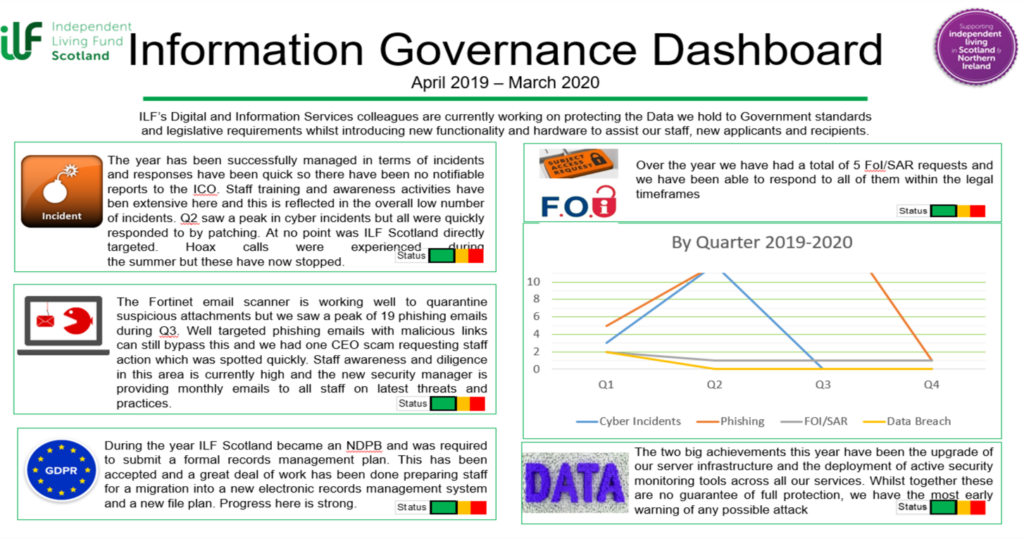
a. The majority of reporting happens via the Audit and Risk Committee and Management Accounts, however the key points for finance are as follows:
As part of the corporate reporting project, the following dashboards show our performance in both the 2015 and Transition Funds:
a. The dashboard below provides an overview for both Scotland and Northern Ireland in relation to the 2015 Fund:
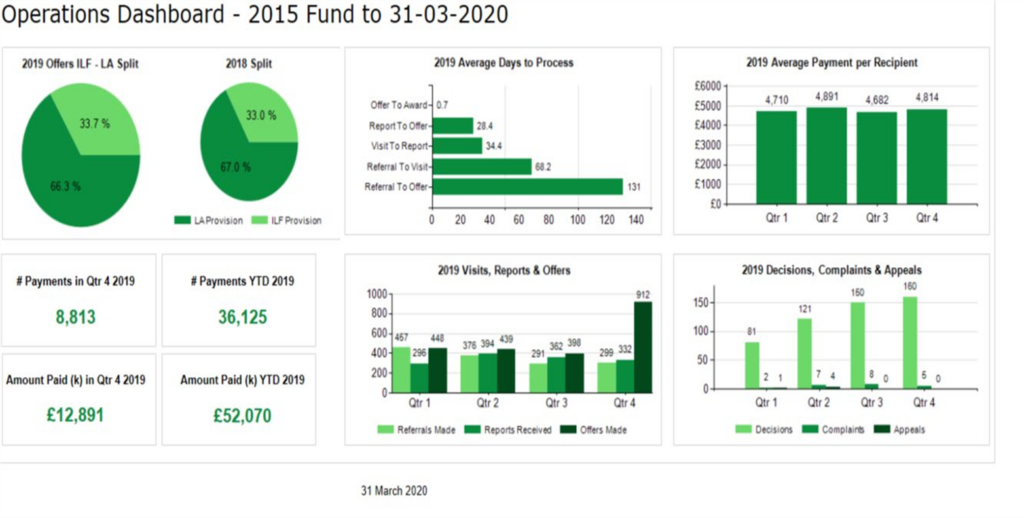
b. The following dashboard provides an overview of operational activity in relation to the 2015 Fund specific to Scotland:
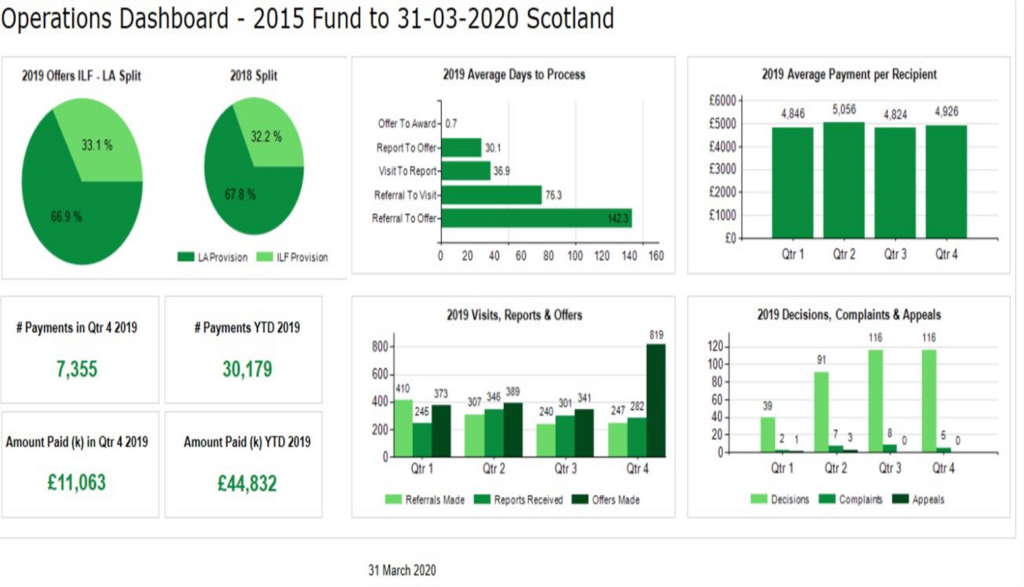
c. The following dashboard provides an overview of operational activity in relation to the 2015 Fund specific to Northern Ireland:
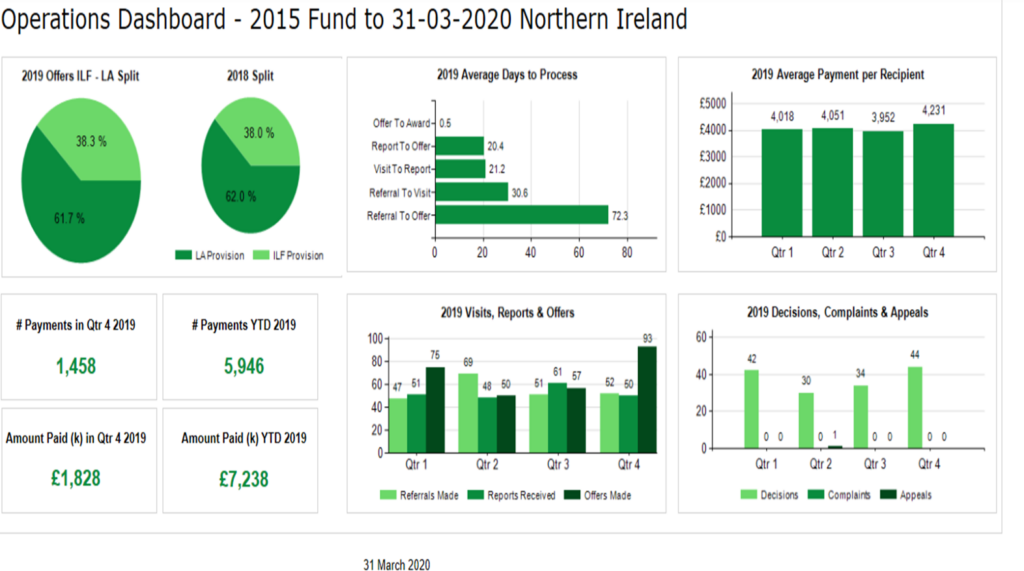
d. The following dashboard provides an overview of operational activity in relation to the Transition Fund:
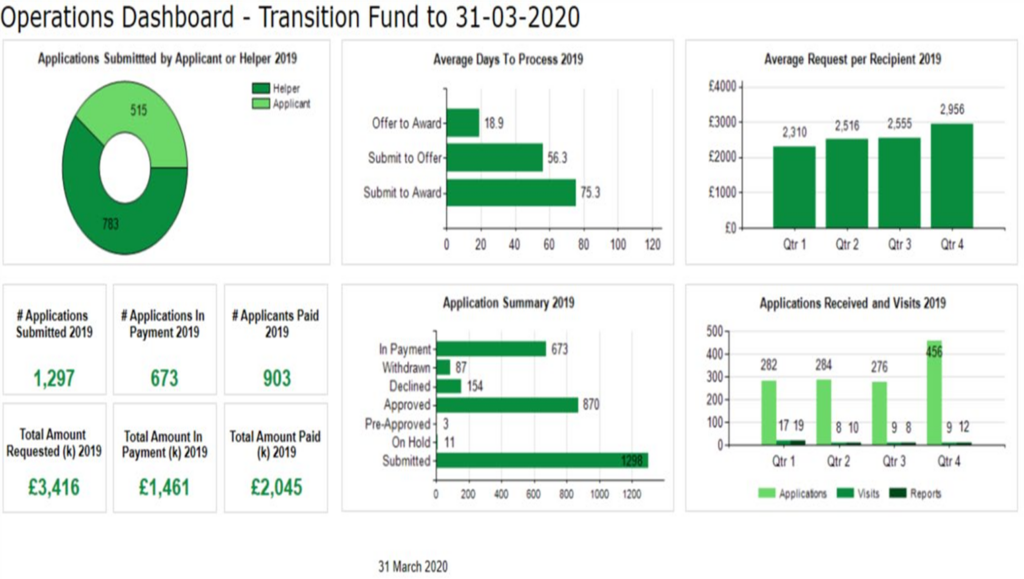
The following table shows the key statistics for the period 1st April 2019 - 31st March 2020 and are aligned to standard annual financial reporting cycles as ILF Scotland is now in steady state operations. It does include Transition Fund which is articulated as Group 3.
